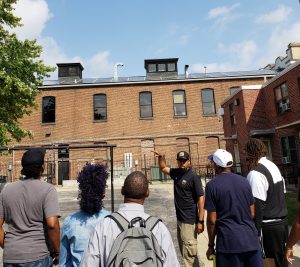Maryland Resiliency Hubs: Open Invitation to Help Neighborhoods
Resiliency Hubs provide sustained power to residents in the event of an electric grid failure. The newest grant from the Maryland Energy Administration (MEA) provides $5 million dollars in funding to help groups complete resiliency hubs serving low-to-moderate income residents. This grant is an open invitation to any local government agency, nonprofit or business interested in supporting neighborhoods in need.
The Maryland electric grid is subject to numerous stresses, including high winds from hurricanes, and tornadoes, and natural disruptions like icing or falling trees. Over current conditions are also an issue, this is when high demand for electricity hits on hot days and residents need air conditioning. Resiliency hubs maintain pockets of energy when a power outage occurs and will be located in densely populated areas; easily accessible by foot.

Resiliency hubs can label or paint specific outlets that will work during a power outage thanks to the solar plus energy storage system at each location.
Resiliency hubs offer an added layer of support services to communities in need. For residents unable to leave an area without power face serious health and wellness issues. This program supports stability within the community during an extended grid outage. Locals can keep safe from severe temperatures, preserve medications, and stay connected with family with a fully charged cell phone.
MEA was privileged to be at the dedication of a resiliency hub in Baltimore earlier this year. POWER House is the first solar powered, community-based resiliency hub in the nation. MEA contributed $250,000 to this project which was organized by the nonprofit Living Classrooms Foundation and private business, Power 52. POWER House underwent a successful field test of their resiliency hub on July 24, 2018 when extreme heat caused a multiple city block power outage. “POWER House was the only building with lights on and we made the best of it, getting elderly citizens inside and grilling food for everyone outside, it turned into a huge neighborhood cookout,” explained POWER House Director, Colin Jones. To learn more about how POWER House works to keep residents safe during and electricity outage, click here.
The location of all approved resiliency hubs will be coordinated with local government offices to address sustainability and emergency preparedness issues. Resiliency hub projects can receive grants up to $2,000 per kilowatt and funding is capped at $501,000 per project. To qualify, all projects must be over 10 kilowatts and use solar as their primary source of power.
Do you know a nonprofit, business interested in sponsoring a resiliency hub? Is your local community looking for help addressing resident needs during power outages? Help spread the word about resiliency hub opportunities here in Maryland. Share this link now.






 1-888-373-7888
1-888-373-7888 233733
233733